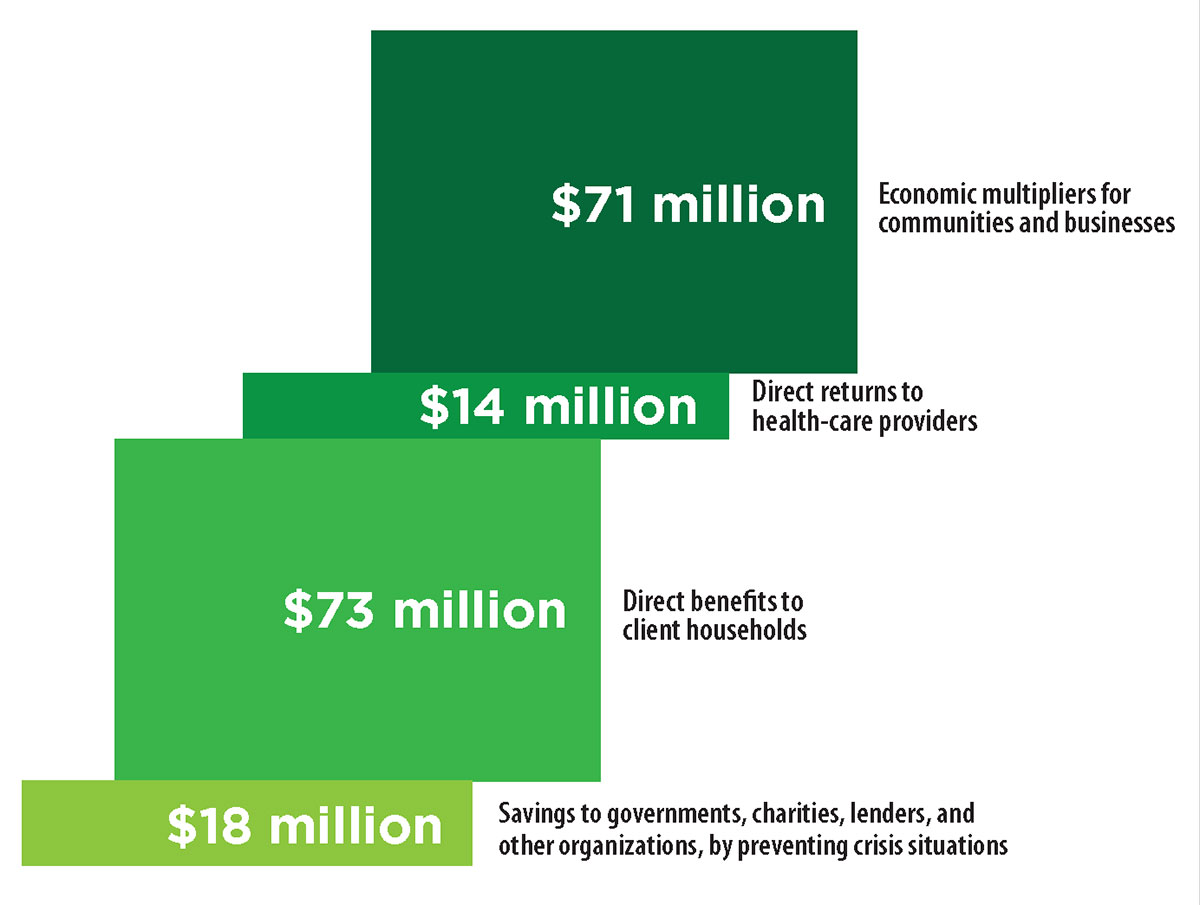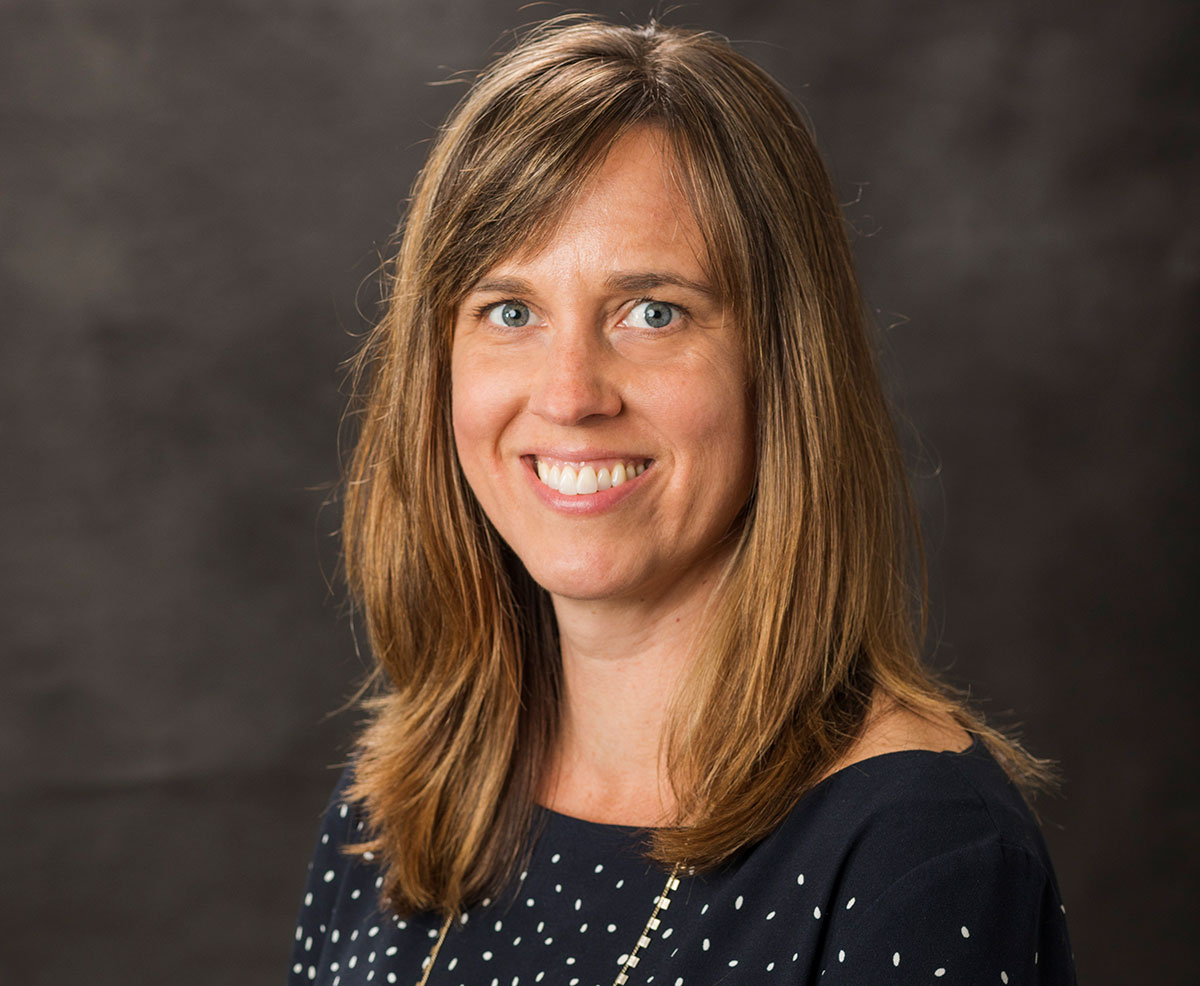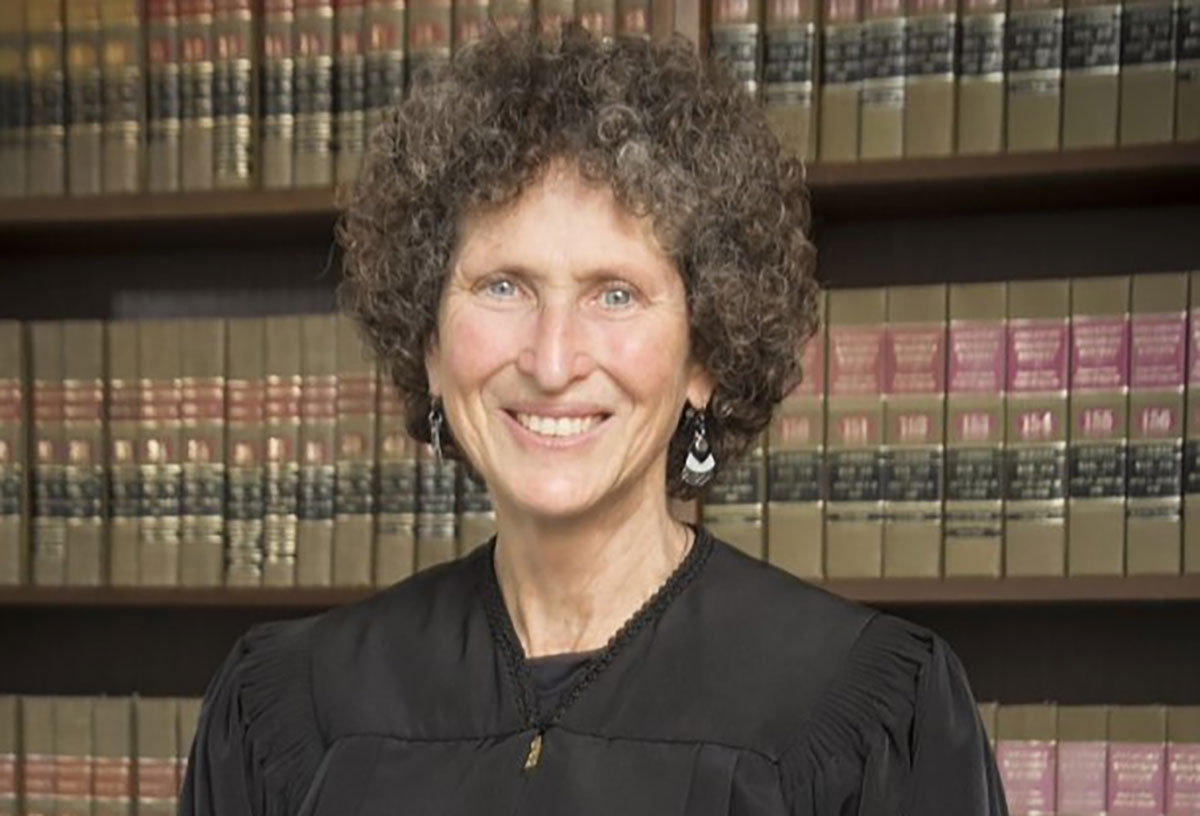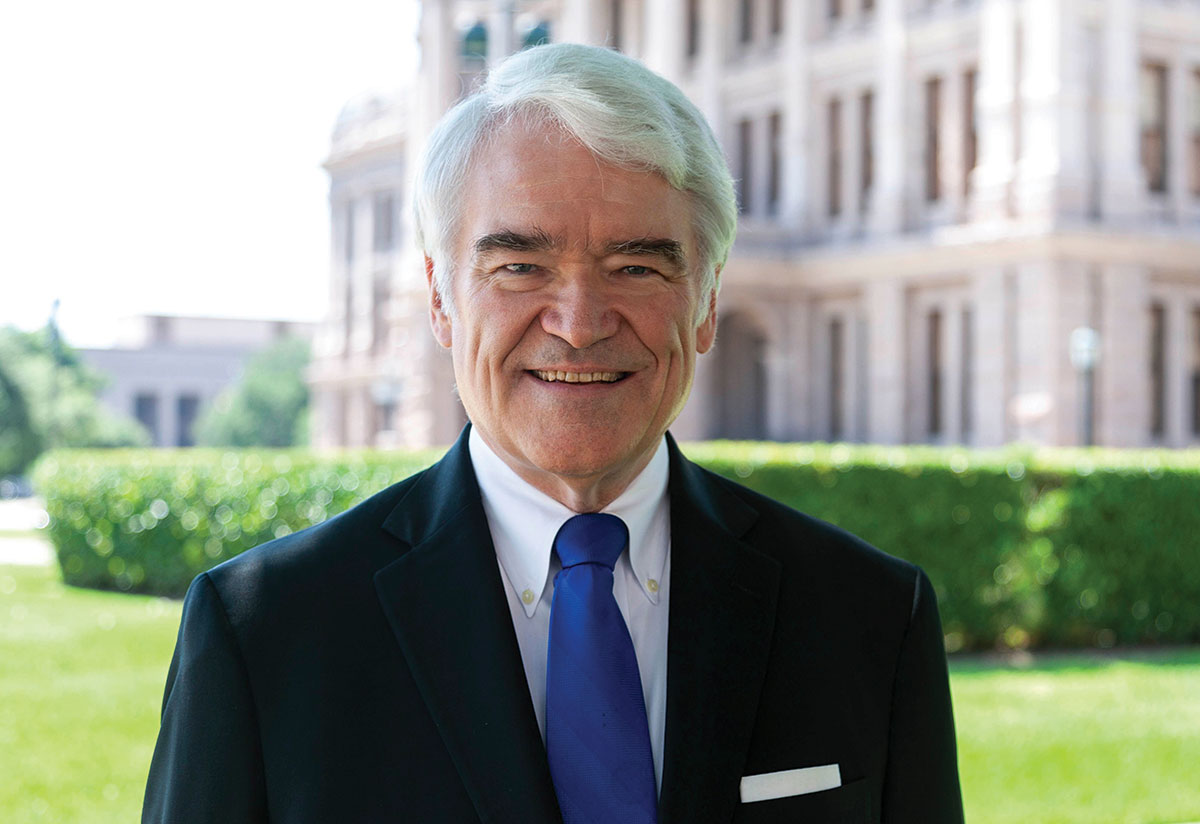
A study commissioned by the Wisconsin Trust Account Foundation Inc. (WisTAF) confirms what legal aid lawyers in Wisconsin have long known: money spent on civil legal services has wide-ranging beneficial effects.
The study analyzed data on legal services provided by the 12 civil legal aid providers who received 96% of legal aid funding in Wisconsin in 2021. According to the study, those 12 providers had a combined economic impact of $176 million, a number that represents an 8.4-to-1 return on the money received by the programs.
The $176 million breaks down as follows:
$18 million in savings to governments, charities, lenders, and other organizations, realized through preventing crisis situations;
$73 million in direct benefits to client households;
$14 million in direct returns to health-care providers; and
$71 million in economic multipliers for communities and businesses in Wisconsin.
Direct benefits to client households included increased child support payments, obtaining federal disability and health benefits, and higher wages received after obtaining federal work permits.
WisTAF works with civil legal services organizations across Wisconsin to increase people’s access to justice.
WisTAF Civil Legal Aid Funding:
$176 Million Impact in Wisconsin

Wisconsin’s ROI Better Than Most States
Ken Smith, Ph.D., president of The Resource For Great Programs, a national consulting firm that works with legal services programs, conducted the study and wrote the report that lays out its findings. Smith has conducted similar studies in 17 other states. The Wisconsin study stands out, Smith said, because of its eye-popping return on investment (ROI).
 Jeff M. Brown, Willamette Univ. School of Law 1997, is a legal writer for the State Bar of Wisconsin, Madison. He can be reached by email or by phone at (608) 250-6126.
Jeff M. Brown, Willamette Univ. School of Law 1997, is a legal writer for the State Bar of Wisconsin, Madison. He can be reached by email or by phone at (608) 250-6126.
“Wisconsin[’s] legal services community is producing a much higher return than average,” Smith said. “The average is around five to seven dollars per dollar of funding. Wisconsin’s average is definitely in the upper quartile.”
Another thing about the Wisconsin study that stood out to Smith is the breadth of legal services offered by programs, many of them small and specialized programs,that are funded by WisTAF.
Smith cited ABC for Health Inc., a nonprofit public interest law firm in Madison, as one example. ABC for Health helps consumers navigate the health-care bureaucracy, often going to bat for clients who can’t get their insurers to cover their medical bills.
“In a very high percentage of cases, they’re successful and the claim gets covered,” Smith said. “The client avoids a huge medical expense that’s going to create debt for them, and the health-care provider gets reimbursed for something they otherwise might have to write off because the recipient of those services just can’t afford to pay thousands of dollars for hospitalization.”
“It’s a very small amount of funding from IOLTA funding, but it has a huge economic impact with a very small staff,” Smith said. “It’s a great example of what I call the ‘catalyst effect:’ a very small amount of legal services at the right time can produce enormous returns.”
What are WisTAF and IOLTA?
The Wisconsin Trust Account Foundation Inc. (WisTAF) is a 501(c)(3) nonprofit organization founded by the Wisconsin Supreme Court in 1986 to administer civil legal aid funding.
At the same time, the supreme court created the Interest onLawyers Trust Accounts (IOLTA) program and the Public Interest Legal Services Fund (PILSF) to raise money for civil legal aid.
Participating financial institutions pay interest rates on lawyer trust accounts that are no lower than the interest rates they pay on regular accounts. A portion ($50) of dues paid by State Bar of Wisconsin members goes to the PILSF.
Additional funding for WisTAF comes from private donations and settlements, class actions, and residual money from certain trust funds.
The operation of WisTAF is governed by Supreme Court Rule 20:1.15 and Chapter 13 of the Supreme Court Rules. WisTAF is governed by a 16-member board of directors and employs four staff members.
Powerful Data
Alex Gulotta, a consultant who worked on the study with Smith, said the study’s results make plain the beneficial effect legal aid programs have on society. He cited housing stability and the work legal aid programs do to help clients avoid eviction as examples.
When a family is evicted, the children often must change schools. That’s a big deal for children with individualized education plans. Additionally, evicted families often are forced into substandard housing.
“Now, your kids are in a house that might have lead paint, or might not be properly maintained, or is infested with pests,” Gulotta said. “All of those things have negative health and education impacts on the community. We’re taking care of that after the harm’s been caused instead of preventing the harm being caused. That’s why stopping an eviction is a big deal.”
Gulotta worked as a legal aid lawyer for 33 years before becoming a consultant. It was as the executive director of a legal aid organization in Virginia that Gulotta first saw the effect that the data has on donors – specifically, data that goes beyond the number of cases closed.
“Being able to go to my local United Way that was giving us $15,000 and being able to talk about ‘we saved this amount of money’ and ‘we brought this amount of money into the community’ was so valuable because it was often several times what we were getting from the United Way,” Gulotta said.
“Until the late 1990s, we only talked about cases, and a lot of places still only talk about how many cases they closed,” Gulotta said. “It doesn’t really reflect the impact we have on people’s lives.”
For Gulotta, providing meaningful data to donors is as important a part of the mission of legal aid organizations as is representing clients in court.
“The data really helps us articulate the need and the effect of the work that’s being done,” Gulotta said. “The more we do it and the better we do it, the better we serve the clients we care about,” Gulotta said.

“The data really helps us articulate the need
and the effect of the work that’s being done.”
– Alex Gulotta, WisTAF study consultant
‘Pound Foolish’
Angela Schultz, assistant dean for public service at Marquette University Law School, pointed out that the benefits that flow from legal services programs in Wisconsin are greater than those quantified in the report.
She cited a free mediation clinic offered at Marquette University Law School as an example.
“Think about every party who’s avoided going to court and ended up with an agreement because they used a free mediation service,” Schultz said.
Schultz went to law school after working in Portland, Ore., at a shelter for domestic-violence survivors; she often accompanied shelter residents to court to help them obtain restraining orders. She said she hopes that the study impels policy makers to boost spending on Wisconsin’s legal services programs.
“I hope there’s a better understanding across the state from the legal community, the law student community, and also non-lawyer communities on where Wisconsin lies on civil legal aid and what we might be missing out on as a state, by not having a more robust investment,” Schultz said. “If we hold ourselves up next to Minnesota, there’s a really big difference in the investment that our states make to civil legal aid.”
Wisconsin ranks near the middle of the pack in funding civil legal services for low-income people.
“The more people know that, I have to believe that will inch us along, in terms of understanding that it’s pound foolish to not make these kinds of investments, because they are really preventative,” Schultz said.

“It’s pound foolish to not make these
kinds of investments, because they
are really preventative.”
– Angela Schultz, assistant dean for public service,
Marquette University Law School
‘Everybody Benefits’
Smith wasn’t the only one impressed by the multiplier dollar amount specified in the study – every $1 dollar spent by 12 legal services organizations funded by WisTAF results in $8.40 in economic benefits to the community. Wisconsin Court of Appeals Judge JoAnne Kloppenburg, who chairs the WisTAF board, said the $8.40 number caught her eye too.
“I think all of us on the board were surprised by the dollar amounts,” Kloppenburg said.
Kloppenburg often sees cases involving litigants representing themselves because they can’t afford a lawyer. Those cases, she said, take up valuable time and resources.
“When litigants have lawyers, everybody benefits,” Kloppenburg said. “The folks on the other side, the court system … everything just happens more efficiently. Resolutions are reached through mutual agreement or the court issues a decision, but because there are lawyers on both sides, everybody’s interests are represented. There’s nothing to appeal. The appeals we see, most of the time, are where folks have not been represented by lawyers.”
“It puts the court in a bind, it makes it harder for everybody to make sure justice is done when someone is not represented by a lawyer,” Kloppenburg said.
Kloppenburg has long been concerned about public interest law. She served in the Peace Corps after graduate school and worked at the Wisconsin Department of Justice for 20 years before winning a seat on the court of appeals.
She said that members of the State Bar of Wisconsin, who are required by a Wisconsin Supreme Court rule to contribute $50 to the Public Interest Legal Services Fund, are as essential to civil legal aid as is WisTAF.
“We couldn’t do this all without the support of the lawyers in the state,” Kloppenburg said.

“When litigants have lawyers,
everybody benefits.”
– JoAnne Kloppenburg, Wisconsin Court of Appeals judge,
WisTAF board chair
‘This is Good Government’
The work done by legal aid programs heartens social justice advocates and appeals to the economically minded.
Take Texas Supreme Court Chief Justice Nathan Hecht. Hecht became involved in legal services programs after becoming chief justice in 2009. He soon learned that the access-to-justice issue reaches beyond eviction hearings and small-claims court.
“As the studies show, it affects the economics of the community, which then affects the structure of the community, it affects business, it affects professional groups, most especially physicians,” Hecht said. “It has wide-ranging effects on the community beyond just the legal profession.”
Hecht said the issue of funding legal services programs is one that crosses political boundaries.
“This is good government,” Hecht said. “You can be a bleeding-heart liberal and worry about these people and all you see is the humanitarian side of it. You can be a let’s-crack-down-on-the-economy type and be for it as well. It’s true in Texas – it’s completely nonpartisan.”
Texas is one of the states that performed an economic impact study before Wisconsin.
“Some of the biggest supporters of access to justice in Dallas are Exxon-Mobil and AT&T,” Hecht said. “It’s good business for them, it helps their employees, they can talk about it to the community, their customers like it.”

“[I]t [access-to-justice
issue] affects the economics
of the community, which
then affects the structure of
the community, it affects
business, it affects
professional groups, most
especially physicians.”
– Nathan Hecht, chief justice,
Texas Supreme Court
‘They Kept the Conversation Going’
If Schultz’s hope for more money for civil legal aid is to be fulfilled, Smith’s study will have to be the beginning, rather than the end, of the conversation.
In the wake of a study Smith performed in New York, the chief justice of that state’s highest appellate court formed a task force. The task force held hearings around the state and, for 10 years, produced an annual report detailing the economic impacts of legal aid funding.
“They didn’t just issue a press release and then forget about it,” Smith said. “They kept the conversation going for a long time with the right people. It would be great if Wisconsin could do that.”
» Cite this article: 96 Wis. Law. 16-20 (November 2023).
